The head of an independent UK unit tasked with investigating allegations of torture and unlawful killing in Iraq has said that British soldiers could face prosecution for crimes including murder, according to an interview published Saturday in The Independent.
"There are serious allegations that we are investigating across the whole range of ... investigations, which incorporates homicide, where I feel there is significant evidence to be obtained to put a strong case before the Service Prosecuting Authority [SPA] to prosecute and charge," Mark Warwick, a former police detective who is in charge of the Iraq Historic Allegations Team (IHAT), told the paper.
Asked whether some cases could constitute war crimes, he responded: "There are lots of significant cases that we are investigating and at the appropriate time it will be a matter for us to discuss with the SPA whether they meet the war-crimes threshold, but there are certainly serious allegations currently being investigated."
The Independent reports:
IHAT's caseload of allegations of ill-treatment or unlawful killing by British forces in Iraq between 2003 and 2009 has risen tenfold since it was established. In 2010, it was dealing with cases involving 152 victims. It is now dealing with more than 1,500 victims, according to Ihat's latest quarterly update. Of these, 280 are victims of alleged unlawful killing by British forces in Iraq, but more than 200 of these cases have yet to be investigated, with just 25 under investigation.
Warwick said his unit hopes to complete its investigations by the end of 2019. But human rights groups are pressing for a faster timeline.
"The incredibly slow pace at which IHAT is investigating allegations of criminality committed by UK soldiers against Iraqi civilians is wholly unacceptable," Carla Ferstman, the director of the human rights charity Redress, told The Independent. "Things seem to still be moving at a snail's pace. We call upon the Government to ensure IHAT can, and does, do what it was set up to do, and to do it now. This cannot be a whitewash."
And Andrew Williams, from the University of Warwick, told the BBC that the process could "drag out for a long time to come"--which, in turn, could hamper investigations.
"In terms of obtaining the witness testimony from the Iraqi civilians concerned, that will be tricky," he said. "They are obviously still based in Iraq and getting hold of them, interviewing them, is a long process and logistically very difficult."
The Independent notes that the UK also "remains under the scrutiny of the International Criminal Court (ICC), which is conducting a preliminary examination of allegations of war crimes by British forces in Iraq."
"The ICC is looking at more than 1,200 cases of alleged ill-treatment and unlawful killing," the paper reported, "including almost 50 Iraqis who reportedly died in British custody."
Meanwhile, the Chilcot Inquiry into Britain's involvement in the Iraq War--which itself has been blasted as a "whitewash"--began in 2009 but has yet to issue its findings.



